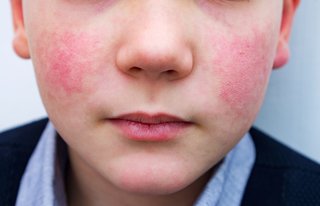Many pregnant women are immune to parvovirus or 'slapped cheek disease'.
If you get parvovirus while pregnant there is a small risk of complications. These include miscarriage or health problems for your baby.
Non-urgent advice: Talk to your GP, midwife or obstetrician as soon as possible if:
- you are pregnant and have been near someone who has parvovirus, even if you do not have symptoms
About half of adults have had parvovirus. If you had it before, you cannot get it again.
Complications of parvovirus in pregnancy
There is a small risk of miscarriage.
There is also a small risk that the virus could cause an infection in your baby. Rarely, this infection can lead to anaemia. This is a blood disorder. It can be very serious for your baby.
Symptoms of parvovirus in adults
Not everyone with parvovirus has symptoms. About 1 in 5 people has no symptoms.
Symptoms may include:
- headache
- sore throat
- blotchy red rash which can look like a slapped cheek - though this is less obvious on brown or black skin and more common in children
- body rash
- joint pain

Slapped cheek syndrome in children
Diagnosing and treating parvovirus
A blood test will diagnose parvovirus. If you have the virus, you may be referred to a specialist obstetrician. You should also have regular ultrasound scans to check your baby's health.
If your baby shows signs of anaemia, they may have a blood transfusion. They can have this when they are still in the womb. This is called an intrauterine transfusion.
How parvovirus spreads
Parvovirus spreads before a rash appears. So you can spread the infection before you know you have it.
Parvovirus is mainly spread through droplets from coughing and sneezing.
Preventing parvovirus infection
You can help stop the spread of parvovirus by:
- washing your hands properly
- not sharing cutlery or utensils
- staying at home if there is an outbreak of parvovirus at your work or school - tell your GP, midwife or obstetrician if this happens